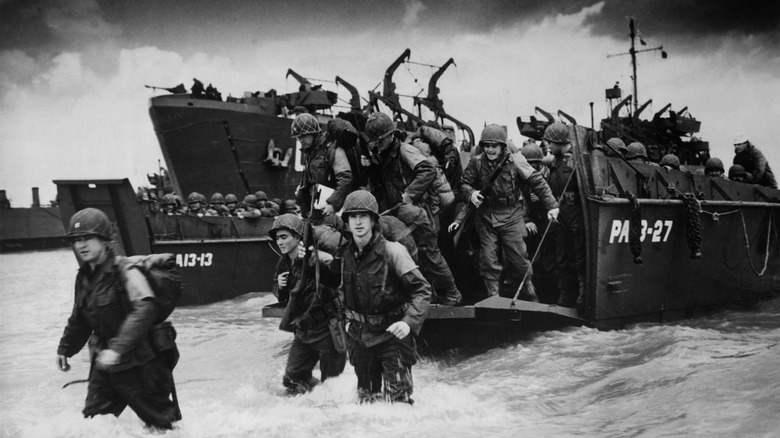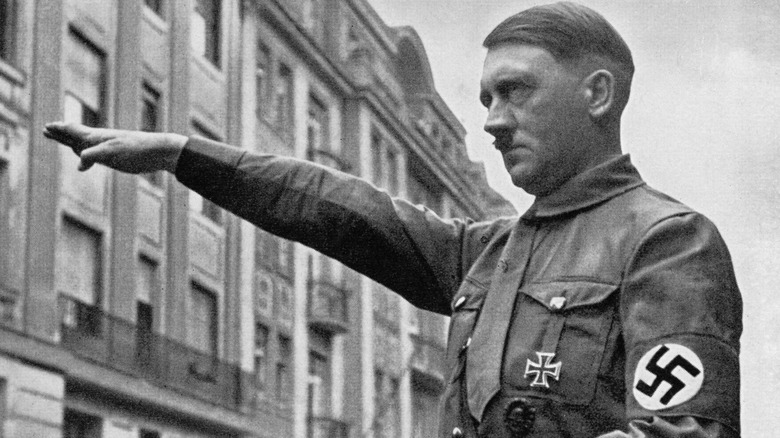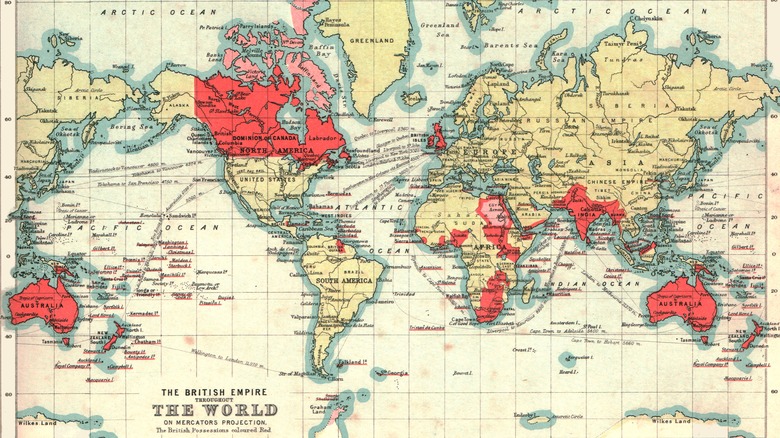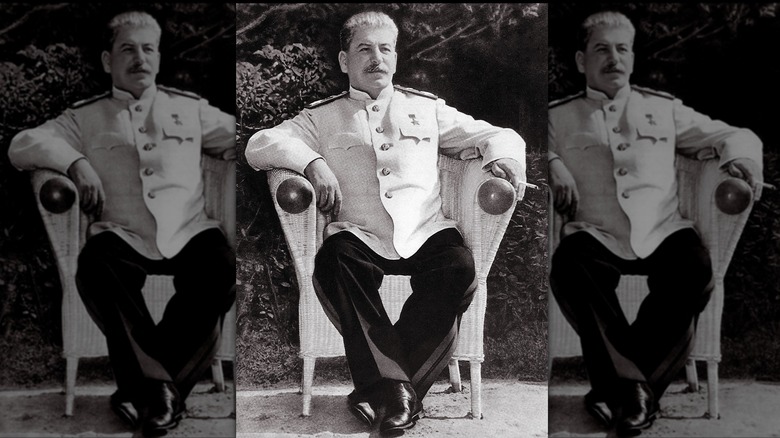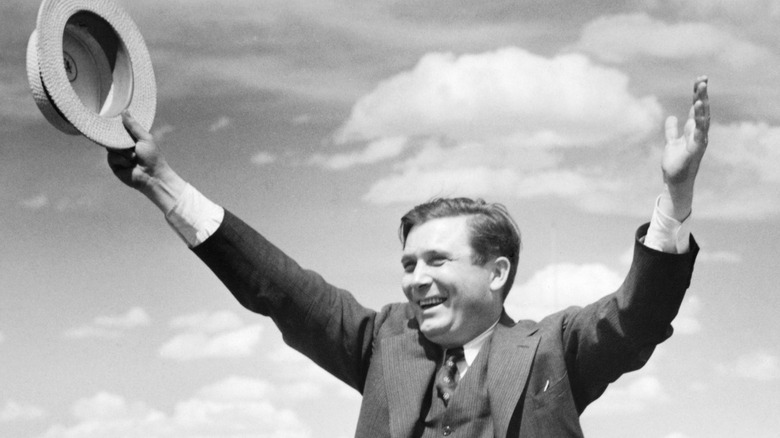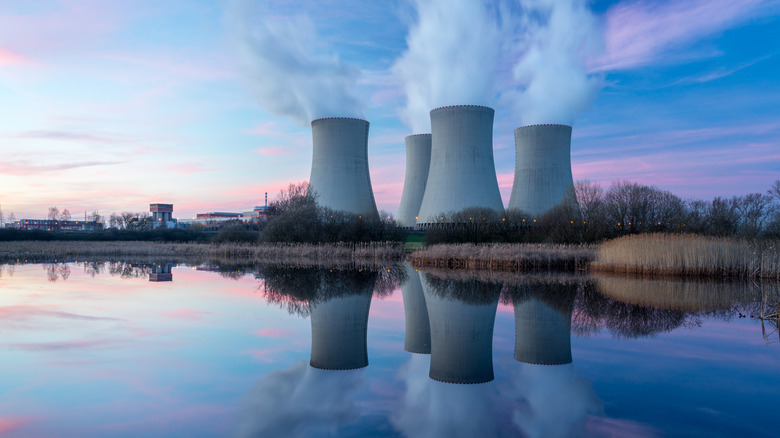What The World Would Look Like If WWII Never Happened
Though it wasn't the war to end war that was promised, World War I certainly remade the geopolitical order of the world. Kings, kaisers, and tsars fell across Europe, new nations emerged from the collapse of ancient empires, and the United States achieved superpower status. But the final settlement of the war was so poisoned that Field-Marshal Earl Wavell contemptuously referred to it as "the Peace to end Peace" (per Anthony Pagden's "Worlds at War: The 2500-Year Struggle Between East and West").
It might be too simplistic to blame World War II on the Treaty of Versailles, but it did leave Europe unstable and may have contributed to the Great Depression, which only fed leftover resentments and renewed nationalism from 1918. Per History, it made the Second World War possible, and when the conflict came, it created even greater fundamental shifts in the world. It accelerated the fall of the remaining European empires and the rise of the U.S. and Soviet Union, enabled a rapid expansion of technology, and left large tracts of the world in such utter ruin — both in decimated cities and lives lost — that 1945 has sometimes been called Year Zero.
But what if it had never happened? What if the lingering tensions in Europe from World War I hadn't been so fiercely kindled? What if world powers seized opportunities to halt the spread of Nazism? We would find ourselves in a radically different world, one without some of the 20th century's worst horror stories — but also perhaps without many of the advancements we've come to know.
Hitler may have been replaced by a kaiser
The beginning of World War II is marked by the German invasion of Poland in 1939. But the aggressive ambitions of the Nazis were apparent well before that. The occupation of Austria and the annexation of Czechoslovakia, both in 1938, sparked fears of a new European conflict within living memory of the First World War. Determined to avoid such a war, Britain and France infamously pursued a policy of appeasement, condoning the annexation of the Sudetenland, which was a German-speaking Czechoslovak territory. The occupation, Mark Grimsley argued in World War II magazine, was crucial to German rearmament ahead of the war (via HistoryNet).
Germany's military leaders did not universally accept Hitler's determination to seize the Sudetenland as sound judgment. Although plans were in place should Britain and France hold firm, Germany was ill-equipped for war in 1938, and elements of its military were deeply uneasy with Adolf Hitler and Nazism. Notably, Lieutenant Colonel Hans Oster spearheaded a plan to use an anticipated invasion of Czechoslovakia as justification for a coup — one that would see Hitler killed and, according to Terry Parssinen's "The Oster Conspiracy of 1938," the German monarchy restored and paired with a British-style parliamentary system.
Per The Washington Post, it's unclear whether the conspiracy was well-planned, as key generals hadn't fully endorsed it. But had Oster and his men been prepared and had appeasement not robbed them of their pretext, Nazi leadership would have been neutralized, the march to Poland and war arrested, and Germany could have become a constitutional monarchy — perhaps remaining one to this day.
Empires might have lingered in a multipolar world
The one-two punch of the world wars has been credited with finishing off the great European empires. The blood and treasure spent on World War I left the British Empire in particular swimming in debt. It also energized subjugated peoples who fought for their colonial masters, driving movements for autonomy and independence — a trend accelerated after the Second World War. The cost of maintaining global empires was evident even before 1914, and by the 1930s, even as staunch an imperialist as Winston Churchill had to reluctantly concede that Britain's empire could only survive a few generations more at most.
But the British Empire was still standing in 1939, as were those of Italy, France, and Japan. The Soviet Union was ascending, and the United States had taken its place on the international stage. It was a world of multiple great powers, each with varying degrees of control over territory and manpower. Without World War II accelerating the decline of the Old World empires and the rise of America and Russia, such a world may have endured, at least for a while.
This world may not have seen the independent states of India, Indonesia, Vietnam, and others emerge for years to decades, and their final character would have been different than what we know. And a multipolar mid-20th century would hardly have been devoid of conflict. The National Interest mused that Imperial Japan might have cultivated regional alliances to retain its holdings in Korea and China, and a Nazi-less Germany may have still fought regional wars in eastern Europe.
The Soviet Union might not have become a superpower
Looking back on World War II, The National Interest couldn't help but note the irony in Germany's fate compared to the Soviet Union's. The Nazis looked upon Russia as an enfeebled giant ripe for the taking. Yet when the dust settled, Germany was in ruins, Adolf Hitler was dead by his own hand, and the USSR under Joseph Stalin made an empire of its seized territory and entered the postwar world as the great communist superpower vying with the United States for influence.
Without the war, it may well not have worked out that way. After all, the raison d'etre of the Russian Revolution — emancipation of the proletariat ahead of a worldwide revolt — failed to materialize. The Russia of the 1920s and '30s was one with intense ideological divisions among its leadership, ending in Stalin's triumph and a purging of his rivals. Government policies helped exacerbate famines that decimated the countryside, and industrialization efforts were marred by self-deception. While on the rise by the late 1930s, the Soviet Union was a deeply troubled state.
Had Hitler been deposed in 1938, he never would have signed the non-aggression pact with Stalin, and a Russia so hobbled would not have been in position to absorb half of Poland. Without the war, the USSR also wouldn't have had the pretext to extend its influence into Eastern Europe. Fears of communism in the West might even have led Britain and France into conflict with Russia — they considered bombing Russian oil fields during the Winter War. And without the war decimating the rest of Europe, a multipolar power system might have endured, diluting Soviet midcentury influence.
America would have a slower, riskier path out of the Great Depression
Franklin Delano Roosevelt spent the 1930s delivering on his New Deal, swept into office by his promises to combat the Great Depression. His programs did alleviate the suffering caused by the economic downturn, but the Depression was still with the world when the president sought an unprecedented third term in 1940. He coupled economic conditions with the specter of the European theater of war in an argument for stability in troubled times, and his personal popularity remained high. But there was considerable unease about shattering the two-term precedent, and without the war, Republican Wendell Willkie just might have eked out a win in 1940.
Willkie, a businessman and former Democrat, was on the liberal side of the Republican Party, and while he harshly criticized the New Deal's economic facets and Roosevelt's rhetoric against the elite, he was an internationalist and civil rights advocate. Professor Samuel Zipp has argued that Willkie would have pushed for legislation on the latter issue (via Brown University). He also supported the social welfare component of the New Deal. But the economic side of the New Deal included reforms and economic guardrails that have helped prevent another depression and strengthen the labor movement. These may have been lost in a Willkie administration. And without World War II to fully mobilize the economy, the Great Depression may have lingered another few years.
The march of progress would have been slowed
The horrors of World War II were accompanied by significant technological progress and a kickstart to burgeoning democratic and civil rights movements. It was as part of the war effort that the United States undertook the large-scale development of penicillin. A study of mustard gas led to a similar breakthrough in chemotherapy. We can trace modern microwaves to radar technology developed by the U.S. Air Force. And of course, World War II ushered in the atomic age, with all its promise and terror.
All of these advancements in science and technology may well have come about without the Second World War. But without the driving force of that conflict, it might have been decades before we came to know them, much less have them available as part of daily life. And without the displacement of so much scientific talent caused by the war, they would have been developed in different places.
In the socio-political realm, a world without World War II is likely a world without the Holocaust. Millions of Jews might have remained in Europe. World War II also helped motivate voters in Western Europe to empower social democratic parties, which in turn led to a dramatic rise in social welfare programs. Women's rights and civil rights gained a push from the war effort, as did independence movements the world over. The advancement of such causes could have happened without the war, but progress may well have been slower and reached through different means.
